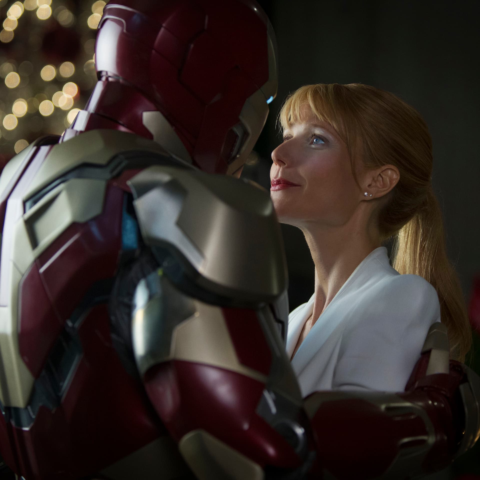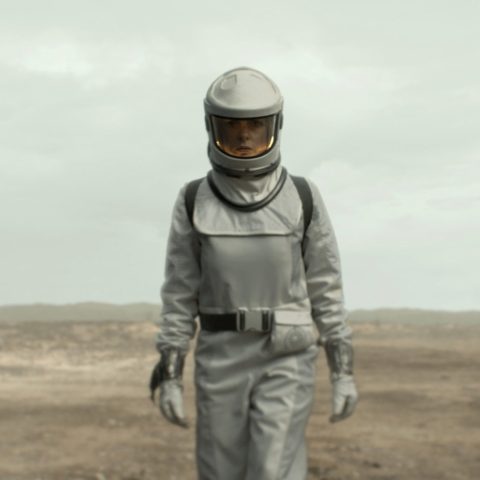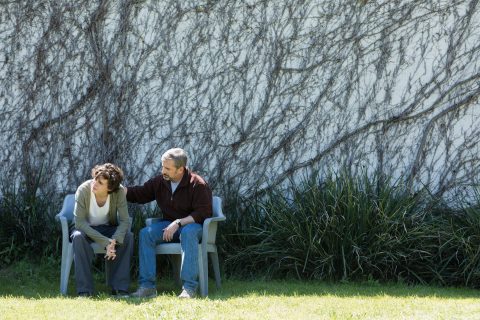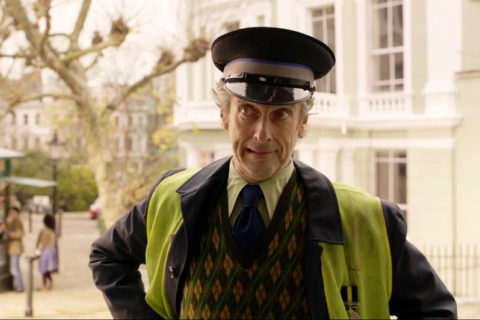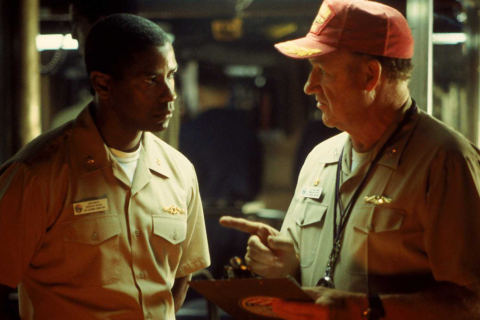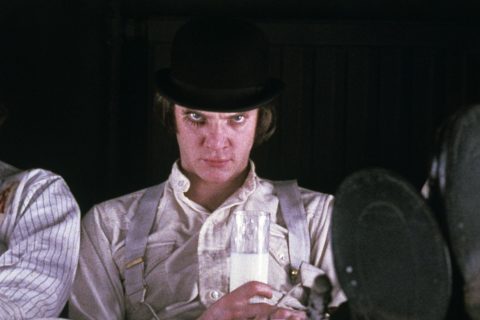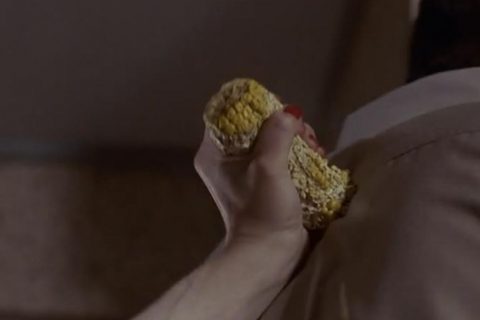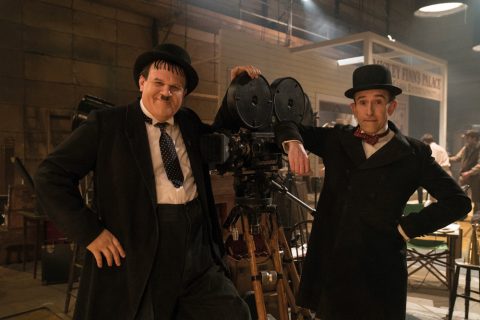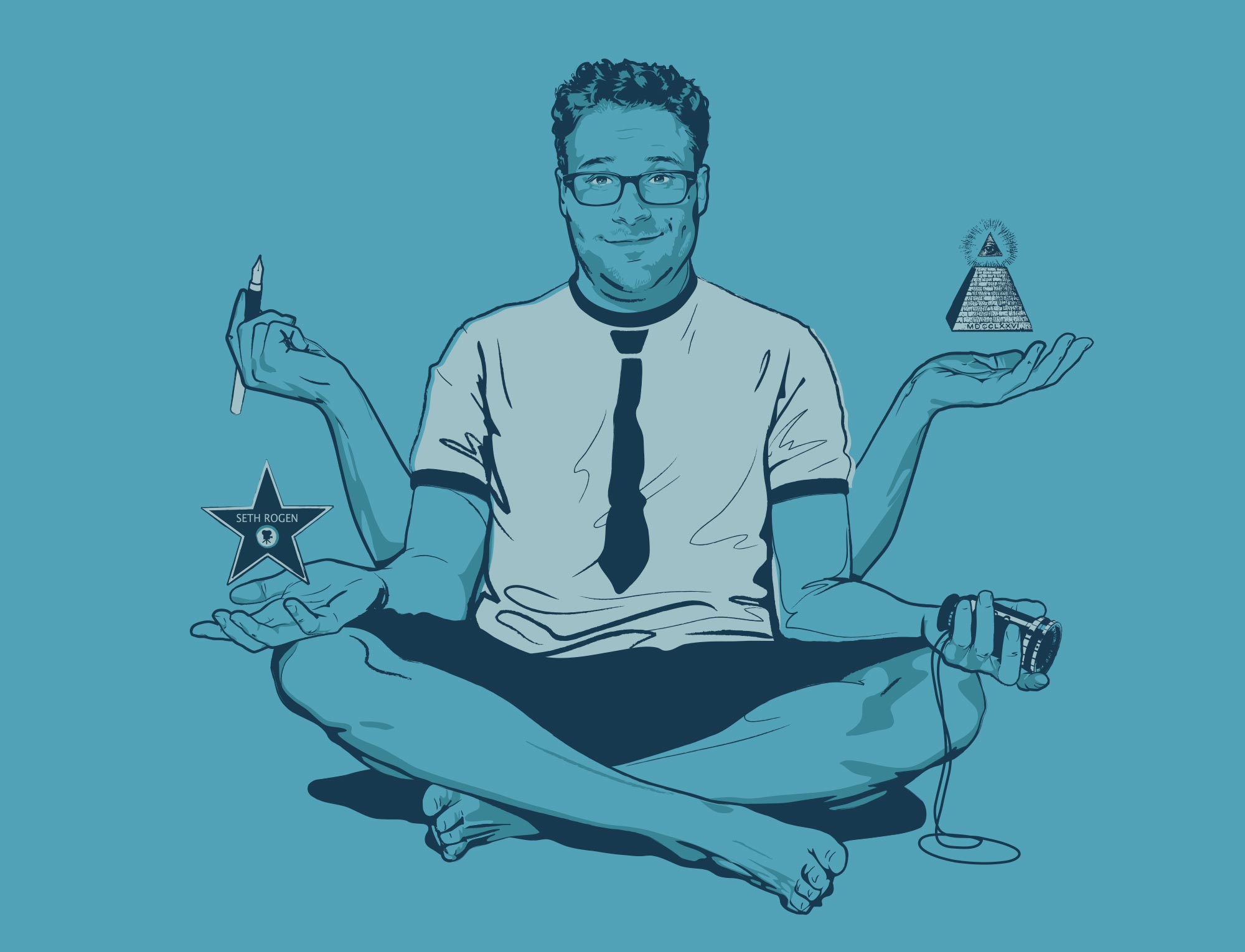
Seth Rogen: The Multi-Tasking Man
Everything up to now has been a learning experience for Seth Rogen. Now he’s ready to take that knowledge and add director to his already impressive CV
Seth Rogen looks fit.
Not an overly confident gym-at-six-every-morning fit like Ricky Gervais, nor a sudden dude-where-the-hell-did-that-all-go transformation of Jonah Hill. Just a bit leaner, a bit lighter, a little bit further down the road from the chunky Afro bouncing, “hurhur” laughing stoner who got Katherine Heigl up the duff in 2007’s break out hit, Knocked Up. He’s also a director. This should come as no surprise, considering Seth and childhood friend and collaborator Evan Goldberg have already worked so hard at both writing and producing, covering everything from big studio mis-fires (2011’s Green Hornet) to indie critical successes (the “cancer comedy” 50/50 which received two Golden Globe nominations). INDUSTRIA caught up with the 29-year-old Canadian as he prepares to shift into the director’s chair…
Actor, writer, producer and now director, which of these do you prefer?
I probably enjoy acting the least. It’s the only one that is strictly scheduled, which I don’t like. Writing and producing are very nebulous in where and when they take place. Acting’s the only thing where I have to be there at a certain time and in a certain place. I like writing the best, probably, because it’s all hypothetical and it’s the most free part of the process.
So do you envisage a time when the acting will take a back seat?
No, because I still like acting. It’s just less enjoyable than the other aspects. At times it can be even more fun, it just feels the most like a job of all the things, again because you have to be there at a certain time. We’re going to direct a movie next, so maybe that will change.
You say ‘we’. Do you mean you and Evan Goldberg?
Yes, Evan and I are directing together.
And it’s an expanded version of your 2007 short film Jay And Seth Versus The Apocalypse?
Yes, Evan and I both really love horror movies. I think horror comedies don’t work often, but when they do they work really well. Tremors is one of my favourite movies of all time. We also found, even with Pineapple Express, that extreme violence can go very well with comedy. So, years ago we made this short film, because we thought it would be funny to make a film about me and Jay (Baruchel) stuck in a house during the apocalypse. Then over the years, Evan and I talked about making it into a movie and about how we could do it. We decided that we probably needed more than just me and Jay. Conceptually, we’ve done a lot of movies about two guys, so we thought it would be interesting to make something with a group dynamic. Like, what happens when a bunch of guys have to work together? So, now it’s about a group of guys holed up in a house together as the world ends around them. They’re so much more fucked up to each other than anything that’s going on outside.
What’s your preparation?
We’re doing pre-vis and concept art. We’ve never done it before so we don’t really know.
Do you talk to directors you’ve worked with before?
We’ve had front row seats to the directing process for a decade now. We’re there every day at every meeting the director’s in; we just don’t get to say the stuff that the director gets to say. Green Hornet was helpful. We got to see first-hand how the most complicated movie imaginable gets made. So, this movie’s much more simple than that. I feel like we’ve been well trained. That’s why we wanted to wait, honestly. We just wanted to make sure that we knew what we were doing.
How does the dynamic work between you and Evan?
I don’t know, pretty well. We’ve been working together a really long time, so it’s evolved. We started writing together when we were 13 years old, so more than half our lives have been spent in a creative partnership, so at this point it’s pretty well defined, not in a way I could necessarily articulate but in a procedural way. It’s definitely gotten better. We’ve both got more responsible and more considerate of how other people work. We hang out when we’re not working, so we don’t hate each other yet, which is good.
Is one of you more business minded than the other?
No. Not at all. It’s one of those things where he’s the this-guy and I’m the this-guy. I think there are moments where we both have something that the other guy doesn’t, but overall we’re pretty similar. We’re not one of those odd couple writing teams. We’ve met with people who will just laugh at how similar we are. We’ve gone to meetings and looked completely disheveled, neither of us has shaved in a week, we’re wearing flip-flops and dirty t-shirts, and they’re just like, ‘Alright’.
Do you have to be very comfortable and completely unafraid of upsetting the other person?
That’s a big part of it. And that’s come over years and years of process tweaking. We’ve worked with a lot of other writers, which is good education also. You learn to be very savvy to the world of writing with other people. It is trusting, but we do make fun of each other’s ideas all the time. It’s up to the writer, to be confident enough to have some bad idea but still pitch those ideas.
You mentioned The Green Hornet, what are your feelings about that movie now?
It made just as much money as people hoped it would – it was designed to make $250 million internationally, which is exactly what it did. What was interesting is that it tested higher than any movie we’ve ever done, and it got worse reviews than any movie we’ve made. That’s what I learned with The Green Hornet: you should know who you’re making a movie for. When you’re making a $100 million movie you shouldn’t be worried about the reviews, you should be worried about how it tests. When you’re making an $8 million movie you should be worrying about the reviews because it’s the quality of the movie that will make it have a life, not the scale and entertainment value. Honestly, when I look back at Green Hornet, do I think it’s our best movie? No. But it’s made more money than any of our other movies and it was an experiment in commerciality and whether or not that was a viable path for us as filmmakers. And what we learned is that we could do it but it’s a fucking pain in the ass and probably not worth the trouble. Some people can be creatively satisfied working on that scale, but for us it’s just much more difficult.
So you wouldn’t do something like that again?
No, the amount of involvement that goes along with it just doesn’t make it enjoyable. To us, the fun part of making a movie is the adventurous aspect of it. It’s the sense that we’re doing this thing and people aren’t going to fucking believe it. They’re going to be shocked when they hear we’re doing it. I think some people are drawn to the scale of it and the shooting, and they want a big set and lots of explosions and Slurpee cups and fast food meals. Having now had all that, the excitement isn’t as appealing as when we’re
alone in a room working on an idea that we know is going to surprise people. But I think if we hadn’t have done it, we would always have been tempted to do it. No part of me regrets making that movie in any shape or form. We learned a lot from it and it made a lot of money and teenagers come up to me every day telling me it’s their favourite movie of all time. We learned more making that movie than we did on any other, but it was ultimately more trouble than even we would probably want to go through again.
You were massively hyped up after Knocked Up. What was that like?
I’ve never been the sort of actor that other filmmakers seemed to want to put in their movies. So there was never that moment where I’m meeting with all these directors who want to put me in their movies. I’m completely fine with it because I make my own movies for the most part, but it was gratifying because some of the other movies we’d been wanting to make we could finally get made, like Pineapple Express. It wasn’t that everyone suddenly wanted me in their movies, it was that finally they let us make the movies that we’d been trying to make for years.
What’s it like when everyone has an opinion on you?
It’s interesting. I’m definitely happy that it happened and I will always be forever grateful that because of Knocked Up and Superbad my life will forever be better. They made a lot of money. I think there’s a lot of luck involved in which movies get to be successful and which don’t. There are some movies that are successful and it’s mind-boggling to me why, and then there are movies that fail and it’s equally mind-boggling. I’m not the best gauge of what people en masse like. Our only strategy is to make movies that we like and hope they align with common taste when they’re released. As far as people having opinions about me, it’s interesting. I used to go online and read things about myself more than I do now. I think when I first became ‘“popular” people seemed to like me, then people on the internet decided that they hated me. But I kind of look at that to mean that I’ve finally maybe become a little bit successful. I feel like when everyone likes you you’re not quite there yet.
Do you go online and read about yourself?
Sometimes. But I don’t sit there googling myself for hours.
That seems a very quick way to make yourself enormously paranoid.
It really doesn’t bother me that much. It’s funny more than anything. I mean, these people are fucking crazy. For a while on IMDB, Evan and I would actively engage in arguments with people on the message boards, “Fuck you, you fucking nerds. You make a movie and see how it turns out”. It was really fun. I don’t think they ever believed it was us, even though we told them.
Your last movie, 50/50, was a semi-autobiographical story written by your friend Will Reiser, about a young guy who discovers he has cancer. Are you surprised that nobody had made a film like that before?
That’s kind of why we did it. When we were experiencing this we had no movie we could reference about what we were going through. I’ve had people come up to me and say, ‘Oh my wife’s pregnant, so we watched Knocked Up’. That’s when we thought maybe we should make a movie about this. We saw a big void cinematically about young people with cancer, especially ones that weren’t just fucking miserable to watch.
At what stage did you encourage Will to write the film?
While he was still sick I would joke about it. But it was just a conceptual idea: young Jew gets cancer and becomes a hitman, or some shit like that.
Did you have any problems getting financing?
Not in getting it made. We approached it modestly. It was an $8 million movie. We made it for far less money than any of our other movies. We knew it had the potential to scare a lot of people, and you’d be crazy not to acknowledge that. I believe in some fiscal responsibility as a filmmaker. So we didn’t want to make the big, over-hyped version of it. I honestly look at some movies and think they’re too big for their subject matter. I compare them to an over-produced indie rock album. They should be small; they don’t need all that noise and fanfare and fireworks. That’s what this movie always was to us. Once you decide you’re making an $8 million movie, everything else isn’t that hard. It’s all kind of manageable.
Why did you want to produce this?
We’ve been executive producing our movies for years, and we just wanted to try doing one on our own, and this seemed like a good option. Again, it was very personal to us, so we felt like we could deal with it well we weren’t scared of it.
Have you always been someone who has a lot of things on the go?
I don’t think so. The thing with movies is that you never know what’s going to happen. I would love to just focus on making this movie next, but you never know if that movie is going to get made next, so you have to have a few things happening at once. Sometimes none of them will happen; sometimes all of them will happen at once, both of which have happened to me. We have a lot of ideas and things we want to do, we just never know which one might actually pick up momentum.
What were you like as a child?
I guess you would say I was a creative kid. I would build shit. I’d make little movies with my friends and build weird weapons. I was probably one of those kids that was off in his own little world.
You did stand-up when you were 13, were you a confident kid?
I think I was in some ways. I don’t think confidence is an umbrella personality trait that covers every aspect of someone. I was confident that I had a unique comedic perspective at that age, but that was all I was confident in. I wasn’t confident that I could perform it well, or that I could even articulate it well. I knew I was coming up with things that I thought were funny. Stand up comics are some of the most self-conscious people you’ll ever meet.
What was the reception like?
It was pretty good. I wouldn’t have kept doing it if it wasn’t. Some nights I was one of the best guys, then other nights I was one of the not so better guys. I was good enough at it that the other comics treated me like a comic. I didn’t feel like a gimmick. There was one other kid who was doing it when I was about 14 and he felt like a gimmick. None of the comics liked him because what he was doing didn’t feel real.
You worked on two TV shows that were respected but cancelled quickly – Freaks And Geeks and Undeclared – what’s that like?
It was frustrating, but in a way it was a good thing to get me started. It’s something that is thematically reflected in many aspects of life, take 50/50: I think it’s the best movie we’ve made, but it’s taken less money than any other movie we’ve made. That’s not to say it hasn’t made its money back and isn’t successful in its own scale, but to me it’s crazy that people are less willing to go and see this movie than any of other movies just because of what it’s about. I think Freaks And Geeks prepared me for that for the rest of my life. You don’t want to think about what it was like to be a loser in high school. You’d rather watch Gossip Girl and think about what it would have been like to drink martinis and fuck the shit out of everyone in high school. You have to be aware of whether or not what you’re working on is something that people inherently don’t want to be thinking about. I think you should never stop making those things, but you should build your expectations around the awareness of that. I think you’ll always have the instinct to try to make it more mainstream than it should be.
Having started so young, what’s it like now that people will be looking up to you and wanting to emulate you?
What’s even weirder is that I’ve directly started to mesh with some of those people I look up to. I remember when Will Ferrell started on SNL, I was in high school and he was like the fucking king of the universe to us. It’s crazy to me that I know him and worked with him several times. When I read articles and am mentioned in the same sentence as people like him I find it very strange.
All of your friends seem to have moved up at the same rate…
It’s crazy. Ten years ago I shared an office with Nick Stoller and now he’s a big film director. I look at the guys who directed Undeclared even – Jon Favreau (he wasn’t even a director then), Greg Mottola and John Hamberg. I feel very fortunate to have been part of this group of people. Even Sacha Baron Cohen. We started working together on Ali G and nobody had heard of him. I remember trying to explain to people what the Ali G Show was. I have a picture on my wall that I took at my house the week I moved in, which is of me, Jonah Hill, Andy Samberg and Paul Rudd hanging out on my balcony. Looking at that picture now it’s amazing that all those people are still friends and still working.




